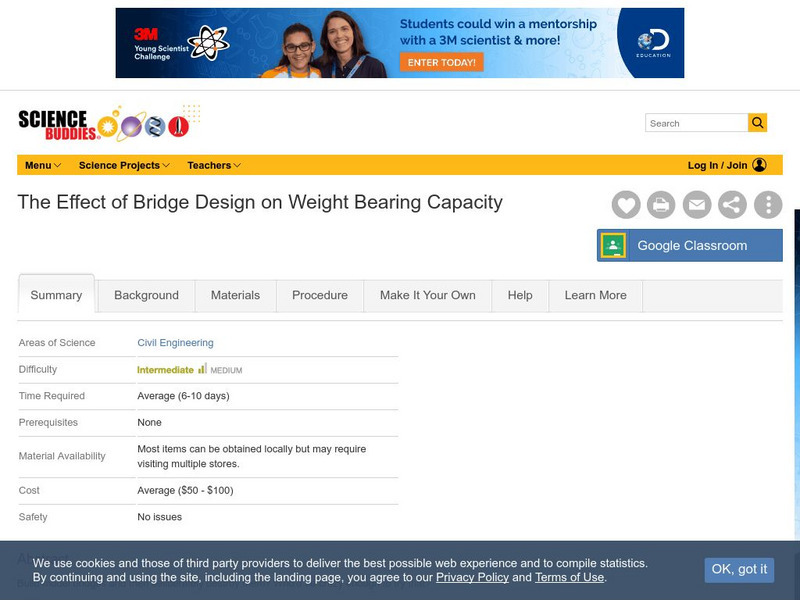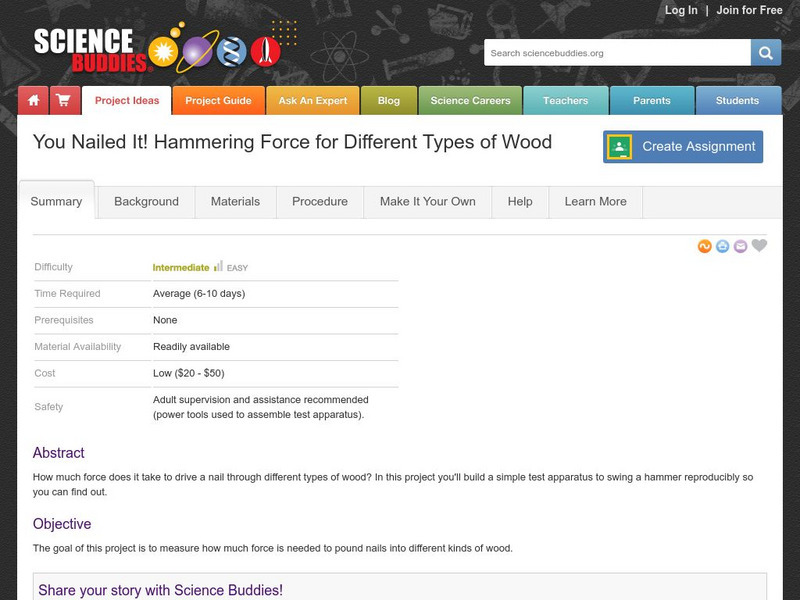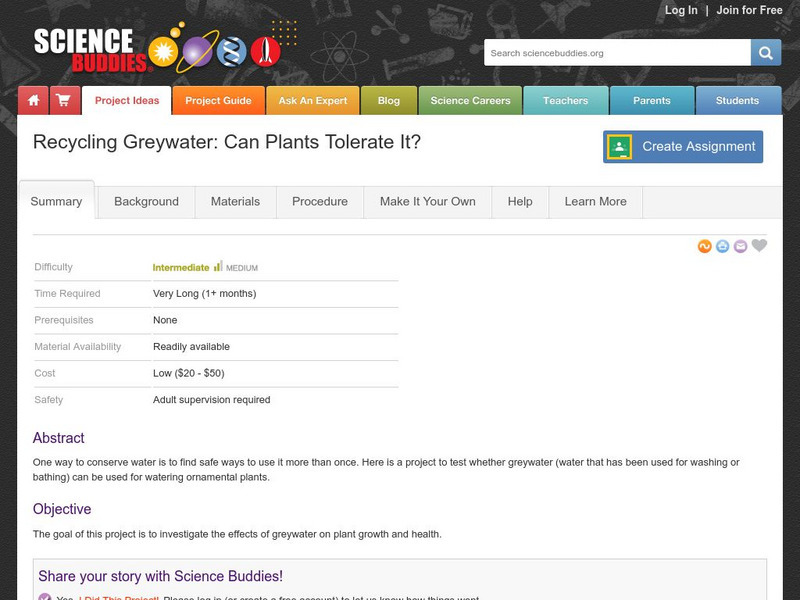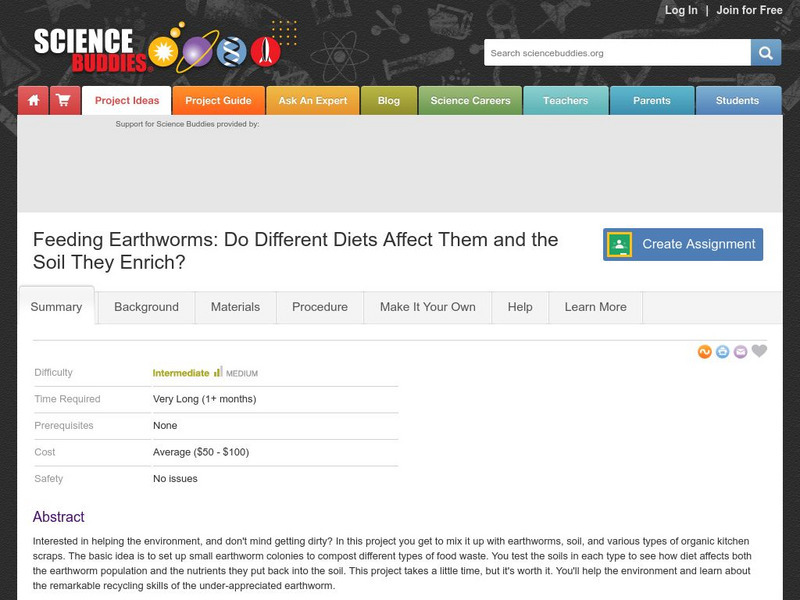Science Buddies
Science Buddies: Which Metal Is the Most Resistant to Corrosion?
Here's a practical engineering challenge: you need to build an enclosure for your dogs, using material that they can't chew through. It's going to be a lot of work to build, so you want to do it right. What material should you choose for...
Science Buddies
Science Buddies: Primary Productivity and Plankton
The oceans contain both the earth's largest and smallest organisms. Interestingly they share a delicate relationship linked together by what they eat. The largest of the ocean's inhabitants, the Blue Whale, eats very small plankton,...
Science Buddies
Science Buddies: The Viscosity of Motor Oil
The insides of a car engine get very hot when the engine is running. Motor oil lubricates the moving parts, to keep the engine operating smoothly. Learn what happens to motor oil as the engine temperature goes up.
Science Buddies
Science Buddies: Let's Go Fly a Kite!
By making a simple sled kite from the template provided and using the suggestions in the Science Buddies project, you can experiment with variables that test different aspects of flight. The Science Buddies project ideas are set up...
Science Buddies
Science Buddies: Efficient Propeller Design
There's a lot to understand about the simple propeller to see how it affects lift and thrust in an airplane or helicopter. This Science Buddies project gives you lots of ideas on how to change the design of the propeller to achieve...
Science Buddies
Science Buddies: The Effect of Bridge Design on Weight Bearing Capacity
This Science Buddies project asks that you identify different kinds of bridges, discover why they are built as they are, and then build three different bridges of your own out of balsa wood. See which one you think can bear the heaviest...
Science Buddies
Science Buddies: Does Chemical Lightening Affect the Structure of Human Hair?
Hair strands can be used as the basis for a hygrometer, a device which measures the humidity level in the air. The goal of this project is to determine whether chemical lightening treatments affect the natural elasticity of human hair.
Science Buddies
Science Buddies:brain Body Connection: Can Exercise Make Our Brains Work Better?
We all know physical exercise is important to keeping our bodies fit. But how important is physical exercise to your brain? In other words, is there any connection between an active body and increased brain power? This is an easy project...
Science Buddies
Science Buddies: You Nailed It! Hammering Force for Different Types of Wood
This Science Buddies project explains how to build a mechanism that will reproducibly swing a hammer so you can determine the amount of force needed to hammer a nail through various densities of wood. The Science Buddies project ideas...
Science Buddies
Science Buddies: Are More Expensive Golf Balls Worth It?
There is a bewildering selection of different golf balls to choose from for playing the game. Some less expensive, some more expensive, all with different claims for the advantages they will bring to your game. This project can help you...
Science Buddies
Science Buddies: Asymmetric Dimple Patterns and Golf Ball Flight
Have you ever wondered why golf balls have a pattern of dimples on their surface? The dimples are important for determining how air flows around the ball when it is in flight. The dimple pattern, combined with the spin imparted to the...
Science Buddies
Science Buddies: Golf Clubs, Loft Angle, and Distance
If your idea of a great weekend morning is taking some practice swings at a driving range, or heading out to the links to play a round, this could be a good project for you. This project is designed to answer the question, what is the...
Science Buddies
Science Buddies: Tee Time: How Does Tee Height Affect Driving Distance?
If you're an avid golfer, this might be a fun project for you. When you're setting up to tee off out on the course, how much attention do you pay to putting the tee in the ground? The height of the tee can affect both where in the swing...
Science Buddies
Science Buddies: Mapping Troposhperic Ozone Levels Over Time
Ozone in the stratosphere protects the earth by absorbing harmful ultraviolet radiation from the sun. However, when ozone occurs in the troposphere, it is harmful to health. In this project you can use data from EPA monitoring stations...
Science Buddies
Science Buddies: Balancing Act: Finding Your Center of Gravity
Like to have the balance of a tightrope walker? Try the more close - to - the - ground balancing test in this easy experiment to learn a few trade secrets of the high wire experts. In this project, you'll find your center of gravity and...
Science Buddies
Science Buddies: How Does Packaging Affect the Ripening of Fruit?
Why do different types of fruits come packaged in different ways? In this project, you will experiment with different ways of packaging fruit to see if it has an effect on the freshness of the fruit. Will a different kind of packaging...
Science Buddies
Science Buddies: Coke & Mentos Nucleation Goes Nuclear!
You may have seen it on You Tube and David Letterman - the exploding Coke and Mentos experiment? But what is it that makes the reaction happen? In this experiment you will see if tiny dimples called nucleation sites have anything to do...
Science Buddies
Science Buddies: Sand Structure: Measuring Density and Porosity of Sand
For many kids, a day at the beach would not be complete without building a sandcastle. Have you ever wondered how it is that you can pack sand into a mold for a sandcastle? Do some kinds of sand pack better than others? This project will...
Science Buddies
Science Buddies: Recycling Greywater: Can Plants Tolerate It?
Water is a valuable resource many often take for granted. This exercise however gives you the opportunity to learn about and discover how greywater (water that has been used for washing or bathing) can be used for watering ornamental...
Science Buddies
Science Buddies: What's the Fastest Way to Cool a Soda?
When you are craving an ice cold drink of soda, the last thing you want is to be stuck with a bunch of soda cans at room temperature. This fun science experiment sends you on a discovery to find the fastest way to cool soda with...
Science Buddies
Science Buddies: How Diets Affect Earthworms and the Soil They Enrich
In this environment-oriented experiment, you will mix it up with earthworms, soil, and various types of organic kitchen scraps. The basic idea is to set up small earthworm colonies to compost different types of food waste. You test the...
Science Buddies
Science Buddies: Mag Nificent Breakfast Cereal
You will devise a way of testing foods for supplemental iron additives in this experiment provided by Science Buddies. Then you will use your design to test different breakfast cereals to see how much iron they contain. The goal is to...
Science Buddies
Science Buddies: Correlation Between Pitch & Age, Gender, Musical Background
Music can be a great way to learn more about science. This project uses music to examine whether there is a correlation between age, gender, or musical background and being able to sing with perfect pitch.
Science Buddies
Science Buddies: Tough Beans: Which Cooking Liquids Slow Softening the Most?
Beans are important to the diets of many people, that is why you always find it cooked a specific way or in a specific dish in different cultures. Here you will learn how the liquid that beans are cooked in affects how quickly or slowly...
Other popular searches
- Science Fair Projects
- Science Fair Project Ideas
- Science Fair Project Data
- Tsunami Science Fair Project
- Science Fair Topics
- Science Fair Projects Ideas
- Science Fair Ideas
- Science Fair Experiments
- Science Fair Project Topics
- Science Fair Exhibit
- Science Fair Presentations
- Rockets Science Fair Project























